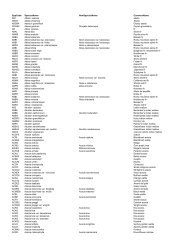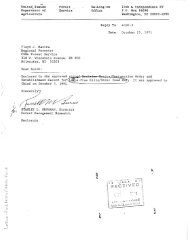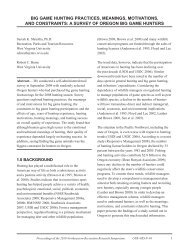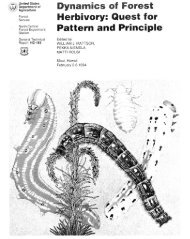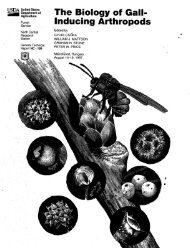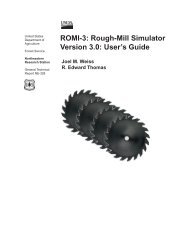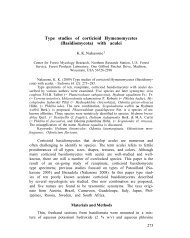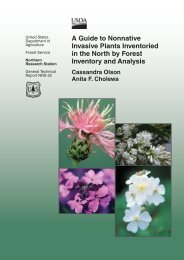Proceedings of the 2009 northeastern recreation research symposium
Proceedings of the 2009 northeastern recreation research symposium
Proceedings of the 2009 northeastern recreation research symposium
Create successful ePaper yourself
Turn your PDF publications into a flip-book with our unique Google optimized e-Paper software.
A qualitative <strong>research</strong> design was used because <strong>of</strong> <strong>the</strong><br />
small class size (20 students) and <strong>the</strong> <strong>research</strong> focus<br />
on <strong>the</strong> perceived course impacts. An email was sent<br />
to all students enrolled in <strong>the</strong> course inviting <strong>the</strong>m to<br />
participate in <strong>the</strong> study. Eleven students requested more<br />
information; six students agreed to participate in <strong>the</strong><br />
<strong>research</strong>. Th e sample size was limited because students<br />
were unavailable for interviews after <strong>the</strong> course and<br />
because <strong>the</strong> <strong>research</strong>er was a unilingual Anglophone.<br />
Some <strong>of</strong> <strong>the</strong> Francophone students may have been more<br />
likely to participate if <strong>the</strong>y could have been interviewed<br />
in French.<br />
Th e participants were interviewed 6 months after <strong>the</strong>y<br />
had completed <strong>the</strong> outdoor education course. An<br />
interview script was used to ask participants to refl ect<br />
on whe<strong>the</strong>r <strong>the</strong> course infl uenced <strong>the</strong>ir environmental<br />
behaviors. Follow-up probe questions were asked to<br />
determine <strong>the</strong> relationships between specifi c course<br />
experiences and environmental behaviors (e.g., What,<br />
if any, aspects <strong>of</strong> <strong>the</strong> course positively changed your<br />
behavior in relation to <strong>the</strong> environment?). Th e interviews<br />
were audio-recorded and transcribed. Data analysis used<br />
<strong>the</strong> constant comparison technique (Glaser and Strauss<br />
1967). Th is form <strong>of</strong> analysis involved reading, rereading,<br />
and coding <strong>the</strong> transcripts, and <strong>the</strong>n comparing and<br />
grouping <strong>the</strong> coded material into <strong>the</strong>mes and sub<strong>the</strong>mes.<br />
To ensure that <strong>the</strong> interpretation <strong>of</strong> data was<br />
valid, <strong>the</strong> <strong>research</strong>er had her academic supervisor review<br />
<strong>the</strong> transcripts to confi rm <strong>the</strong> <strong>the</strong>mes.<br />
2.1 Participants<br />
Four <strong>of</strong> <strong>the</strong> six participants were female and two were<br />
male. Only two interviewees, one male and one female,<br />
had previously participated in an outdoor education<br />
program (Table 1). Th e female had gone on several short<br />
outdoor trips during one academic year for high school<br />
physical education credit and <strong>the</strong> male had completed<br />
a 6-day outdoor course. One student was Francophone<br />
while <strong>the</strong> o<strong>the</strong>r fi ve were Anglophone. Th e participants<br />
are identifi ed in this paper with pseudonyms.<br />
3.0 RESULTS<br />
In terms <strong>of</strong> <strong>the</strong> perceived impact <strong>of</strong> <strong>the</strong> course on<br />
environmental attitudes, all participants stated that<br />
Table 1.—Characteristics <strong>of</strong> participants<br />
Participants Age Gender Language<br />
Previous Outdoor<br />
Ed. Experience<br />
Abby 21 Female English No<br />
Brianne 22 Female English No<br />
Colin 27 Male French Yes<br />
Dave 22 Male English No<br />
Erin 22 Female English Yes<br />
Faye 21 Female English No<br />
<strong>the</strong>ir attitude towards <strong>the</strong> environment became more<br />
positive following <strong>the</strong> course. Even those who already<br />
had a positive attitude before <strong>the</strong> course reported<br />
an improvement in <strong>the</strong>ir environmental attitude. In<br />
particular, <strong>the</strong> 48-hour “solo” on <strong>the</strong> 11 th and 12 th<br />
nights <strong>of</strong> <strong>the</strong> course and <strong>the</strong> peacefulness that <strong>the</strong><br />
students experienced in nature infl uenced changes in<br />
<strong>the</strong>ir environmental attitudes. Most knowledge gain was<br />
in <strong>the</strong> areas <strong>of</strong> personal survival skills (e.g., fi re building,<br />
navigation) and self-knowledge (e.g., confi dence).<br />
Qualitative data analysis <strong>of</strong> <strong>the</strong> interviews for this study<br />
found that almost all participants reported that <strong>the</strong> course<br />
had some infl uence on <strong>the</strong>ir environmental behaviors.<br />
Increased participation in outdoor activities, participation<br />
in communal environmental action, and environmental<br />
behavior transference to daily life were <strong>the</strong> main <strong>the</strong>mes<br />
observed in <strong>the</strong> data.<br />
3.1 Increased Participation in<br />
Outdoor Activities<br />
After completing <strong>the</strong> outdoor education course, several<br />
participants indicated that <strong>the</strong>y had become more active<br />
outdoors through increased participation in activities<br />
such as whitewater rafting, kayaking, running, and<br />
canoeing. For instance, when asked about <strong>the</strong> long-term<br />
impacts <strong>of</strong> <strong>the</strong> course, Colin said:<br />
I’m going outdoors more than I did usually and<br />
I just bought my fi rst pair <strong>of</strong> hiking boots and<br />
each weekend<br />
I go into <strong>the</strong> woods for like 2 hours just to calm<br />
down and everything, because you know in <strong>the</strong><br />
city you have to go very fast.<br />
<strong>Proceedings</strong> <strong>of</strong> <strong>the</strong> <strong>2009</strong> Nor<strong>the</strong>astern Recreation Research Symposium GTR-NRS-P-66<br />
32




